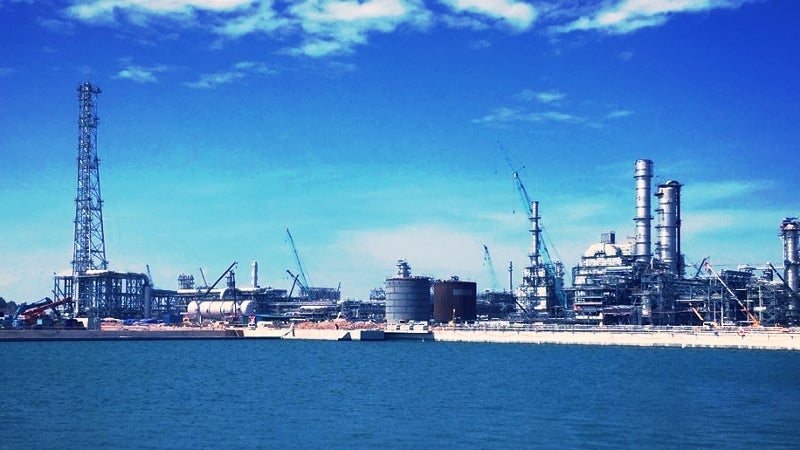

Nghi Son oil refinery and petrochemical complex is located in the Nghi Son Economic Zone, approximately 260km away from Hanoi, Vietnam.
It is the second refinery to be developed in the country, after the Dung Quat refinery.
The Nghi Son project aims to improve energy security in Vietnam and help meet the growing demand for refined and petrochemical products due to the country’s rapid industrialisation and modernisation.
Nghi Son refinery will cost an estimated $9bn and is being developed by a joint venture (JV) between four companies, including Vietnam Oil and Gas Group (PetroVietnam, 25%), Kuwait Petroleum Europe (KPE, 35.1%), Idemitsu Kosan (35.1%) and Mitsui Chemical (4.8%).
The JV formed an organisation named Nghi Son Refinery and Petrochemical Limited Liability Company in order to develop the project.
Construction of the refinery complex commenced in October 2013 and mechanical completion was achieved in April 2017.
The refinery is expected to begin commercial operations by the end of 2017.
Site and location details of the Vietnamese refinery
The Nghi Son refinery complex is situated in the Tinh Gia District of Vietnam’s Thanh Hoa Province.
The refinery will occupy an area of 325ha, which required the resettlement of 1,500 people from 350 households.
Processing units at the Nghi Son complex
Nghi Son refinery’s main process units include a crude distillation unit, LPG recovery unit, LPG treatment unit, Kerosene hydrodesulphuriser, gas oil hydrodesulphuriser and residue hydrodesulphuriser.
A residue fluid catalytic cracker (RFCC), RFCC light gasoline treater unit, RFCC LPG treater unit, propylene recovery unit and indirect alkylation unit have also been installed at the site.
In addition, the refinery will include a polypropylene unit, naphtha and aromatics complex, hydrogen manufacturing unit, sour water stripper units, amine regeneration units, sulphur recovery units, and tail gas treating units.
Offsite facilities at the refinery include eight tank systems for feedstock, featuring a capacity of 120,000m3 each.
The storage facilities will provide capacity for roughly ten days of operation. Intermediate and final product storage, as well as facilities for import and export of feed and products, are also set for inclusion at the refinery.
Infrastructure and site facilities
Marine facilities at the Nghi Son refinery include single point mooring (SPM), a breakwater, crude oil import pipelines, loading / unloading jetties, a service ship quay, material offloading quays, seawater intake and discharge facilities, and a landing quay.
Other facilities at the site include control and electrical systems, and effluent treatment, firewater and flare systems.
Power for the refinery’s operations will be produced by gas and steam turbine generators. The refinery will also include utilities for cooling water, power, steam, and plant air.
A 48in-diameter and 35km-long crude oil pipeline will run between the SPM and the tank storage facilities for the import and export of products.
The pipeline will be offshore for 33.5km, while the remaining 1.5 km will be located on-shore.
Products and capacity
The Nghi Son refinery will process and refine 200,000 barrels of crude oil a day to produce 2,204kt of premium diesel annually, as well as 1,470kt of regular diesel and 1,153kt of gasoline.
LPG, jet fuel and various other petrochemical products will also be produced at the facility.
Financing for Nghi Son oil refinery
Japan Bank for International Cooperation and the Export-Import Bank of Korea are providing $2.3bn funding for the project.
Another $2.7bn is being provided by domestic and overseas banks, including the Bank of Tokyo-Mitsubishi UFJ, Sumitomo Mitsui Banking Corporation, Sumitomo Mitsui Trust Bank, and Mizuho Corporate Bank.
Contractors involved with the refinery and petrochemical project
A consortium comprising JGC Corporation, Chiyoda, GS E&C, SK E&C, Technip France (France) and Technip Geoproduction (Malaysia) was awarded the engineering procurement and construction (EPC) contract for the project.
Toyo Construction was awarded the EPC contract for the refinery’s offshore facilities.
Foster Wheeler Energy provided the FEED study for the project, while Royal HaskoningDHV supplied marine engineering services and Menard Group conducted improvement works at the site.
TW Group carried out site investigations and ABB Lummus Global conducted the initial feasibility study. ADEN Services were responsible for project camp management.
Van Leeuwen Singapore supplied carbon steel pipes for the development, while Atlas Copco Rental provided oil-free air compressors and GE delivered the project’s gas turbines.
Flenco provided auxiliary systems, and Mitsui Engineering & Shipbuilding supplied the refinery’s steam turbine generator.
The Enersul Limited Partnership of Calgary were responsible for the facility’s sulphur granulation units, and Doosan Heavy Industries supplied the pressure vessels, towers and heat exchangers.


